Being the most funded Action in the Erasmus+ programme, Key Action 1 provides thousands of individuals with a unique opportunity for international mobility every year.
If you’re involved in an organization working in the field of education, training, youth or sport, you can apply for Erasmus+ funds and take part in a meaningful experience abroad.
Let’s discover which are the main opportunities in the fields of school education and vocational education and training (VET) and how to make the most of them.
Contents
KA1: Opportunities for Schools
Teachers and all staff in charge of school education in primary schools, secondary school and higher education (also vocational education and training, schools for adult education and youths) can apply for funding to run mobility projects to offer training and/or teaching opportunities to staff and learners.
Check out our +300 training courses for teachers in the most beautiful European cities.
Pupils mobility
If you want to provide your pupils with an exciting experience abroad, you can choose between three kinds of learner mobility:
- Group mobility of school pupils (at least 2 pupils per group, from 2 to 30 days) – your pupils can study in a hosting school abroad or at the seat of an Institution of the EU, and they must be accompanied by their teachers for the whole duration;
- Short-term learning mobility of pupils (from 10 to 29 days) period of study at a partner school or traineeship at a relevant organization abroad;
- Long-term learning mobility of school pupils (30 to 365 days) period of study or traineeship abroad with an obligatory pre-departure training.
Moreover, all physical mobility activities can be blended with virtual ones.
Are you looking for a host partner for your pupils’ mobility? Do you want to become a hosting organization? Contact us, we can help you!
Invited Expert – Training Course and Support

The Erasmus+ Programme, in its Key Action 1 (KA1), also supports a mobility activity called Invited Expert. In the same KA1 Application where your school can ask for funds to send their staff and students abroad, you can also invite experts from another Programme country. This mobility activity is particularly useful as it allows every teacher from your school to take part in a training course directly in their hometown.
Who is an expert?
The new Erasmus Programme Guide says that experts are “trainers, teachers, policy experts or other qualified professionals from abroad who can help improve the teaching, training and learning at the receiving organization” (Erasmus+ Programme Guide 2022 p. 88). The invited experts may provide training to all the staff of your institution, helping the teachers in implementing new teaching methodologies as well as transferring good practices in organization and management.
Why should you invite an expert?
If you are going to apply for a short-term KA1 project, or for accreditation, we suggest that you include at least one expert visiting your school in your application. Indeed, in the past, the European Commission has shown great appreciation for projects which have implemented the most relevant changes in the Erasmus+ Programme.
Invite a Europass expert
Have you applied for the new Erasmus+ opportunity “Invited expert” in your project? Are you looking for the right expert for your school?
We have many qualified trainers located all over Europe who are specialized in a large variety of subjects. If you’re in doubt about which training is more urgent for your school, have a look at our catalogue, we offer more than 300 teacher training courses!
Once you’ve chosen the main topic of your course, our staff will find the most suitable professional among our trainers. We will then design a teacher training experience responding to your specific needs.
Europass trainers will be available at your school for a minimum of 2 days to 6 days max for €250,00 per day. Your school is also required to cover travel expenses and the cost of accommodation for the trainer during the course.
KA1: Opportunities for Vocational Education and Training – study visits

Not only schools and universities can apply for learning mobility for students and staff, but providers of vocational education and training (VET) can also participate in staff and learners’ mobility. If your organization aims to prepare young people and adults for specific occupations or for the job market in general, you can apply within the VET sector.
Staff mobility
Among KA1 activities, there are also professional development courses for teachers/trainers and invited experts.
We have implemented some courses regarding the vocational and training-based education of several European nations. These VET courses are designed to become more specific according to participants’ needs and requests.
- VET: The German System (Study Visits in Berlin)
- Finland VET System (Study Visit in Helsinki)
- The Croatian Educational System (School Visits in Split)
- The Irish Education System (Study Visits in Dublin)
Learners mobility
Not only do VET learners have the same mobility opportunities as school pupils:
- Group mobility of VET learners (at least 2 learners per group, from 2 to 30 days) – they can learn together with their peers in a hosting VET provider abroad, and they must be accompanied by their teachers all along;
- Short- and long-term learning mobility of VET learners (from 10 to 365 days) period of learning with a strong work-based component at a partner VET provider, or in a company abroad;
But they can also take part in VET skills competitions: international sectoral events aimed at promoting and recognizing professional skills, know-how, and technological innovations in VET.
Erasmus+ Accreditation & Short-term applications
There are two different procedures through which you can access the Erasmus KA1: the accreditation or the short-term project application, let’s see the difference.
Erasmus+ Accreditation
In order to get the grant continuously for the entire duration of the new Erasmus+ Programme (2021-2027), each school, or a consortium of schools, can apply for Erasmus+ Accreditation. When requesting accreditation, you must state that your school complies with the Erasmus quality standards, and illustrate the European Development Plan of your school for the following six years. Once accredited, your school will have facilitated access to mobility funds for the following 6 years, by presenting a budget request in line with the school development plan outlined in the Accreditation application.
-> Discover more about the Erasmus+ Accreditation
Short-term project applications
However, if your school didn’t manage to get accredited this year (the deadline is usually in October), you still have many opportunities to participate in the Programme this year. For instance, your school can:
- apply for short-term projects that last from 6 to 18 months and can include up to 30 participants in mobility;
- join a consortium that has already been accredited;
- act as a hosting organization for another accredited foreign school.
Institutions from Erasmus+ Programme Countries can submit a mobility project application to the National Agency in their country, check the deadlines!
